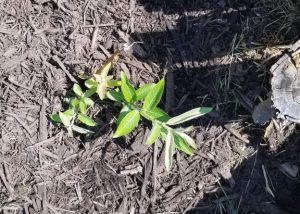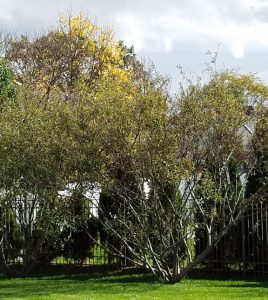Friday morning was unusually warm for midwinter, so my husband and I went rowing in our double scull. We had the boathouse and the river all to ourselves. When the sun came out, it felt like a pleasant early spring day. Although we weren’t rowing fast, my hands got a little blistered because my calluses go away quickly when the rowing season ends. My husband, who has tougher hands, was fine.
The blisters didn’t really bother me because we had such a good time getting outdoors in the lovely weather. Of course, it did not last long. Soon after we returned home, the temperature started to drop, and by evening we were back to ordinary winter weather.
I spent the afternoon playing a computer game with my husband and then re-reading The Princess Bride on my Kindle. Nothing came to mind that had to be done. That left me with an odd feeling, as if the mainspring on some kind of mental machinery had gotten close to winding down, like a mechanical toy or music box with a winding key. This wasn’t the same as my lack of energy before Christmas vacation—I had gotten plenty of sleep all week, and rowing had not left me physically tired.

(Creative Commons image via flickr)
Rather than spend any time pondering this oddity, I decided that whatever tasks might need to be done could wait a day or two. Surely I would think of them in the morning. In the meanwhile, this seemed like a good night to stay in and watch one of the movies that my husband had just bought. I went to bed afterward and slept well.
When I woke up, there was no doubt something had changed. In the mental space where the imaginary wind-up machinery had been, there was only silence. After a minute or two, I realized what had happened—my internal to-do generator had shut down. You know, the one that switches itself on sometime in the teenage years, or perhaps even sooner, and chugs along continuously forever.
How could this be? I’d had vacations for a week or two before—plenty of them, in fact—but the to-do list never had spontaneously evaporated like this. Was it even possible for a modern-day adult to function without having a long list of tasks automatically load itself into the brain at boot-up?
Most likely, it would come back sometime later in the morning, I decided. Kind of like a brief power outage. No reason to worry. So I got my breakfast and opened my Kindle to the page where I’d left off yesterday. There was certainly nothing wrong with a nice relaxing morning while on vacation.
Afternoon came and I still didn’t have anything in mind to do. That was when I began seriously wondering what the heck was going on. Maybe I was coming down with some strange new disease. I hadn’t noticed any changes in my health this week, though, so I didn’t rate that as likely. As far as I could tell, I was generally healthy—about the same as always, but for the mysterious disappearance of the to-do list.
Meanwhile, my husband was sitting at the computer writing programs, which he likes to do when he’s on vacation to keep his skills sharp. Ordinarily when he does this, I’ll spend some time writing stories and blog posts, or maybe work on some other creative project. When that thought came to mind, it left me worrying—what if the disappearing to-do list might be a variation on the dreaded Writer’s Block? What if all my creative energy had drained away, too?
That, at least, could be tested. I got a notepad and pen, sat down on the couch, and started writing the first draft of this blog entry. I didn’t have any problems getting my thoughts organized on the page, which was a relief. Once I took a break when I wasn’t sure how to end a sentence, but that was nothing out of the ordinary. Apparently, my brain is still functioning much the same as before, except that the day is almost over and I still haven’t seen hide nor hair of the vanishing to-dos. Maybe they decided to take a vacation too.









